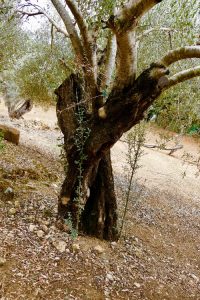HOMILY ADVENT WEEK 01 02 – Year I
Jesus – Shoot from the Stump of Jesse
(Is 11:1-10; Ps 72; Lk 10:21-24)
*******************************************
There is a bumper sticker that reads, “If you want peace, work for justice.”
The powerful readings for day two of this first week of Advent inspired me to adapt that saying to become, “If you want peace, justice and joy in your life, then put your complete trust in Jesus, and follow him into a more intimate relationship with the Father.”

Nezer Olive shoots
During a pilgrimage to the Holy Land, our group visited a recreated 1st century village in Nazareth, where we learned that olive shoots spring up out of the ground from the roots of the olive tree. That shoot is called in Hebrew Nezer, from whence comes the word Nazarian. How interesting that this natural phenomenon adds to the certitude that Jesus, who was a Nazarian, is also the shoot of Jesse’s tree prophesied by Isaiah.
In the Old Testament, Jesse was the son of Obed, the grandson of Boaz and Ruth, and the father of King David. David was the youngest of Jesse’s eight sons. The appellation “son of Jesse” served as a synonym for David both at Saul’s court and, subsequently, when David became king.
Isaiah points out that this shoot of Jesse will be filled with the Spirit, and then lists the gifts of the Spirit which have become associated with confirmation in the Church. This root of Jesse is the one who gives us all those gifts of the Holy Spirit, the one who alone can bring about justice and peace in our world.
The psalm underlines the fact that this Nazarian will bring about a justice that will flourish into the fullness of peace.
In the Gospel, Jesus the Nazarian, the shoot of Jesse’s tree, sends out seventy disciples. That number symbolizes fullness, completion, wholeness, infinity – Jesus has come to bring human history to its destined end. When they return, how fitting that he who is filled with the Spirit, who sends the Spirit into our lives to forgive and to heal, should rejoice in the Spirit, again fulfilling the prophecy of Isaiah.
Then Jesus teaches a truth that must have troubled the Jewish religious leaders who to this day refuse to believe in him – he and the Father are one – so he is the Son of God, and the only one who can truly reveal to those who will believe, who the Father really is. Even as Jesus prays, he is revealing to the Father to us, and the intimate relationship he has with the Father – the same relationship he wants us to have with the Father, through him.
On the cross, Jesus would utter the words, “It is finished.” Those words refer to his mission to reveal to the world the depth of the Father’s love – and now we know who our God really is – humility, mercy, compassion, unconditional love, forgiveness and total non-violence. That is an image of God that our world, addicted as it is to money and pleasure, prestige and fame, power and control, also resists. They simply cannot see and hear that truth.
I returned from the Holy Land with a much deeper appreciation of the blessings of being a Christian – it is not how often or how we pray that really matters, it is how deeply we believe in Jesus as the revelation of the Father; how profoundly we enter into an intimate relationship with him and the Father, and how well we live out his teachings to love one another as he has loved us that really matters.
That love is nourished and strengthened especially, I believe, by following Jesus’ example of communing with the Father in contemplative prayer. That practice perhaps sets us apart from the other two major religions in the Holy Land, which seem to place more emphasis on saying prayers and following dietary rules and ritual observance.
I think the joy we felt throughout our pilgrimage, despite the physical hardship, struggle to sleep at times, weariness of travel and loss of some items, flowed out of our profound faith in who Jesus is. We realized how privileged we were to be able to learn more about the mystery Jesus presents us each day of how our loving God is at work in our lives, filling us with a sense of deep peace, a desire to work for justice as he did, and the joy of knowing how deeply we are loved.
The Eucharist we celebrated in so many sacred places, once in a hotel room very much like the Last Supper, bonded us together in an ever-deepening sense of being the Church, the Body of Christ, called to bring peace, justice and joy to our wounded world.



